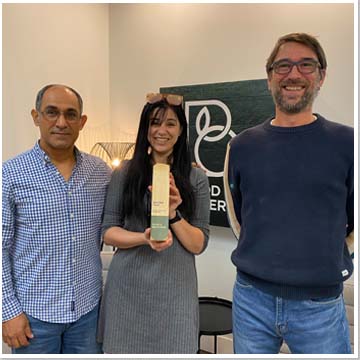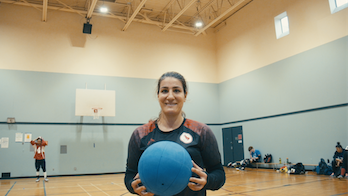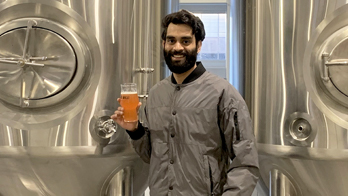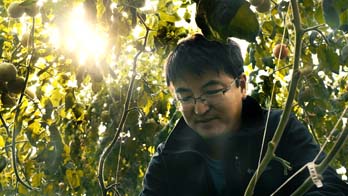These newcomers from Iran and Serbia were so shocked by food waste in their new country that they started redistributing food to those in need. Today, they feed more than 3,500 people every month.
#ImmigrationMatters in Vancouver, British Columbia – Keeping hunger at bay—and food out of landfills
Keeping hunger at bay—and food out of landfills
September 29, 2022
Share:

Ali Haeri (left), Reihaneh Mirjani (center) and Igor Bjelac (right)
For most people, it would be quite a feat to start a business or even a charitable organization after immigrating to a new country. Ali Haeri, Reihaneh Mirjani, Igor Bjelac, Young-Suk Bong and Basem Tawadrws did both.
Each arrived in Canada in 2015. Eventually they found themselves in the same English as a Second Language class in Coquitlam, a suburb of Vancouver. Igor had immigrated from Serbia, while Ali and Reihaneh, who are married, came from Iran, Young-Suk Bong from South Korea and Basem Tawadrws from Egypt. One day, their teacher showed the class a documentary about food waste.
"It shocked us, as people from countries where we don't call food 'ugly' or have best-before dates," says Igor. "Once we were comfortable in Canada, we wanted to give something back. We realized this was how we could contribute."
I ran a completely for-profit business in my home country. But when you do that, you have only money. Soul Bite is about helping people. Sometimes I'm super tired, but feeling that people benefit from what I do gives me the energy to continue.
Ali Haeri, co-founder, Soul Bite Food Inc. and the Immigrant Link Centre Society
With the help of their classmates, they began collecting food from grocery stores that was close to its "best before" date or one day old and delivering it once a week to 20 families. Soon they were working 3 days a week and were operating out of a church. Their approach was so successful that they formed a charitable organization called the Immigrant Link Centre Society (ILCS).
After ILCS was operational, they realized the team could do more if they had a reliable income stream. The group decided to start a food-based social enterprise. The result was Soul Bite Food Inc., which makes affordable plant-based food inspired by traditional Persian and Serbian recipes. The company started out selling to grocery stores around the Lower Mainland, and recently expanded into Alberta and Saskatchewan. Even more impressive is that 50 percent of its profits are donated to ILCS so that the charity can continue supporting other community organizations.
Food for the Soul Project Society is 1 such organization. Based in the Vancouver suburb of Maple Ridge, the organization supports people who struggle with addiction. Program coordinator Aida Tajbakhesh says she deeply appreciates the weekly food deliveries ("rain or shine") and other support that her program receives from Soul Bite Food Inc. and ILCS.
It's a beautiful thing to have organizations working together and uplifting each other for the greater good of communities. This has been especially important during the pandemic, which was such an isolating time.
Aida Tajbakhesh, program coordinator, Food for the Soul Project Society
"We see a lot of stigma in our field," she says. "To have Soul Bite support us without judgment makes us feel very safe. They've given us an opportunity to reach out to the homeless community here."
In 2020, ILCS won the Tri-Cities Chamber of Commerce 2020 Business Excellence Award for Not-for-Profit of the Year. In 2021, Soul Bite Food Inc. won the BC Food & Beverage Community Impact Award, and in 2022 it won the Premier's People's Choice Award. This award recognizes small businesses based in British Columbia that have the unwavering support of their community.
Today, ILCS delivers food 7 days a week to about 30 community groups, like churches, women's centres, drop-in and addiction centres, and a Salvation Army location, thanks to its 175 volunteers. Annually, the organization redistributes $5 million worth of food—about 850 tonnes—saving an estimated 1,900 tonnes of emissions in the process, while making a difference in the lives of so many. Their goal? To continue improving access to affordable, healthy foods for Canadians at risk of food insecurity.
Igor was first featured in 2019 in a story about the Immigrant Link Centre Society. Find out how Igor’s journey began.
Immigration profile: Vancouver, British Columbia
Quick facts:
- Immigrants in the Vancouver area represent 41% of the population.
- More than 58% of immigrants who came to the Vancouver area between 1980 and 2016 were economic immigrants, while nearly a third (31%) were sponsored by family and 9% were refugees.
- More than 1 in 4 workers in the food and beverage sector in Canada is an immigrant.
Did you know?
- Approximately $31 billion worth of food is wasted annually in Canada. When food is wasted, so are the energy, water and resources that were used to produce it.
You may also be interested in ...
 Inspiring the next generation of athletes
Inspiring the next generation of athletes
Knowing her true potential as a Paralympic athlete, Maryam came to Canada determined to wear the maple leaf and inspire younger athletes.
 Brewing up excitement in Brandon
Brewing up excitement in Brandon
Black Wheat Brewing in Brandon, Manitoba, is the city’s first craft brewery, and residents have welcomed its newcomer brewmaster with open arms.
 Introducing new farming techniques to Western Canada
Introducing new farming techniques to Western Canada
Using solar greenhouse technology, a geologist from China is helping Albertan farmers extend their growing season.
Page details
- Date modified:




